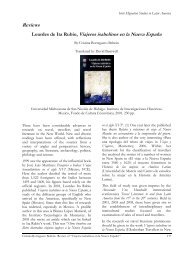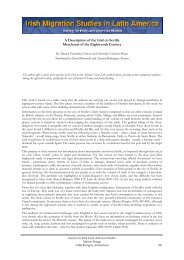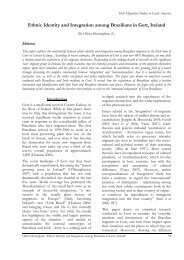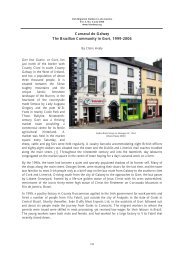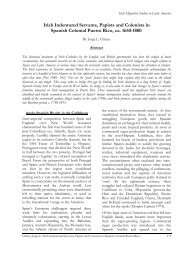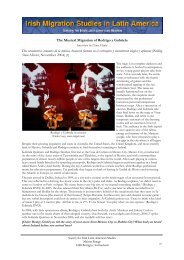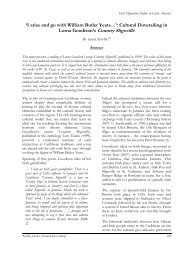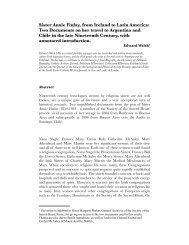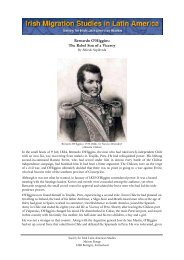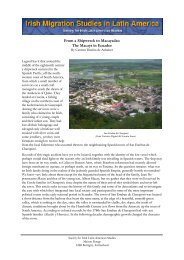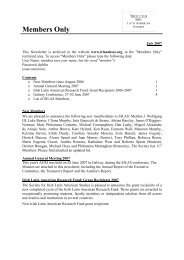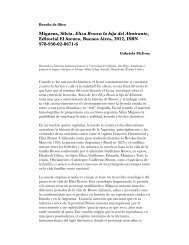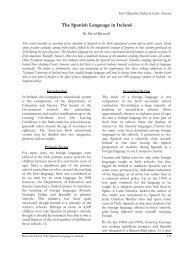I:6 Anti-dumping - Society for Irish Latin American Studies
I:6 Anti-dumping - Society for Irish Latin American Studies
I:6 Anti-dumping - Society for Irish Latin American Studies
Create successful ePaper yourself
Turn your PDF publications into a flip-book with our unique Google optimized e-Paper software.
children of tenant farmers in Ireland, who would never have other means to climb the social ladder. As<br />
Graham Davis put it <strong>for</strong> the <strong>Irish</strong> colonists from Wex<strong>for</strong>d in Mexican and Revolutionary Texas:<br />
Where previous histories have fostered an image of oppressed victims driven into exile from their native land, I<br />
argue that emigrants were able and willing to make their own choices, weighing up future prospects against their<br />
own situation. These emigrants were predominantly small farmers from some of the most affluent parts of Ireland<br />
and possessed sufficient capital to finance the trip and buy provisions <strong>for</strong> a year. Surviving letters point to their belief<br />
that they would do better in acquiring several thousands acres in Texas than renting a few acres in Ireland, if not<br />
<strong>for</strong> themselves, then certainly <strong>for</strong> the next generation [Davis 2002: 71].<br />
The 'Westmeath' and 'Wex<strong>for</strong>d' sending areas (Patrick McKenna 1992<br />
Many factors contributed to create the reputation of Argentina as a region were land acquisition was easier<br />
than other places, particularly, letters and news from early emigrants, newspapers articles in English<br />
published in the British Isles and in Argentina, and travel handbooks. Additionally, since Argentina was<br />
not part of the <strong>for</strong>mal British Empire (though connected to England by strong trade and social links up to<br />
the 1930s), most legal burdens at home would not annoy the emigrants in their adopted country. There<strong>for</strong>e,<br />
it was perceived by the emigrants that in Argentina they would be free from debts and other commitments<br />
that obliged them in Ireland.<br />
Once they made the decision to emigrate to South America, the preparation was very complex, and<br />
represented <strong>for</strong> the emigrants a detailed exercise of travel planning. Departing from the Midlands or from<br />
Co. Wex<strong>for</strong>d, the usual road taken by the emigrants bound to Argentina ended in Dublin. From there the<br />
emigrant crossed to Liverpool, and took a ship sailing to Rio de Janeiro, Montevideo, and Buenos Aires.<br />
However, McKenna argues that 'a considerable number of the first <strong>Irish</strong> emigrants, who were travelling<br />
under sail, may well have travelled along the established trading routes between Ireland and the United<br />
States and then used the trading route between the US and Argentina to complete their journey'<br />
[McKenna 1994: 154]. This may have been especially valid <strong>for</strong> the first decades of the nineteenth century,<br />
when the South Atlantic ocean was still dominated by Spanish and Portuguese ships. Occasionally, the<br />
ports of Dublin and Cork were used to sail directly to South America when ships were chartered to this<br />
purpose. Nevertheless, there is no doubt that after 1840 and until the 1880s the vast majority of emigrants<br />
used Liverpool as their port of departure due to the greater availability of shipping lines, frequencies, fares<br />
and accommodations. There is also circumstantial evidence that some of them have gone from the port of<br />
Southampton, but Liverpool was the preferred port during the nineteenth century [3]. Fifty-four percent<br />
of 6,447 <strong>Irish</strong> emigrants who arrived in Buenos Aires in the period 1822-1929 boarded at Liverpool,<br />
followed by Queenstown (today’s Cobh), with 28 percent [<strong>Irish</strong> Argentine Historical <strong>Society</strong>, Database of<br />
<strong>Irish</strong> Passengers to Argentina].<br />
Edmundo Murray, The <strong>Irish</strong> Road to South America..................................................................... 29



